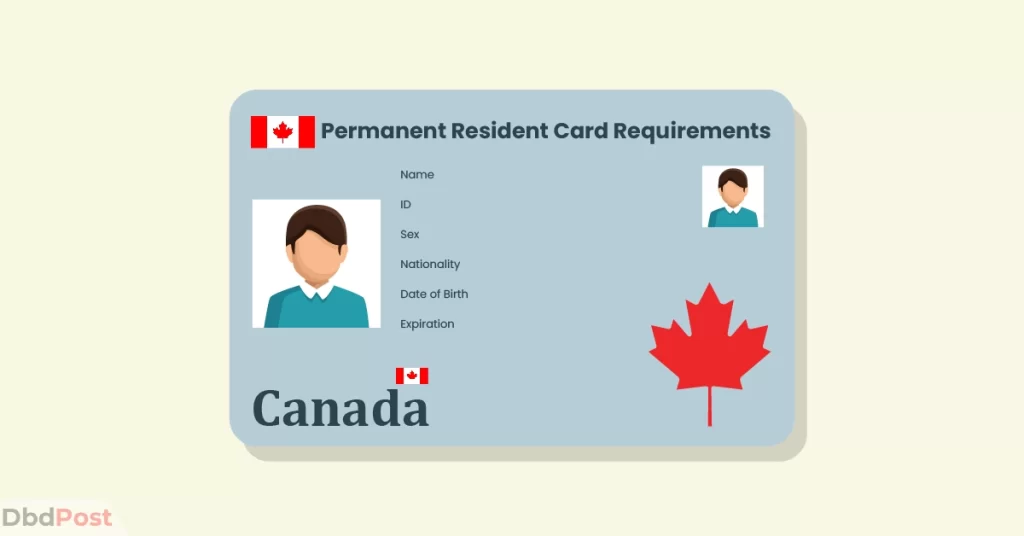Ready to make a life-changing move to Canada as a permanent resident? Then, you’ll need to have a firm grasp of the Canada PR requirements.
The general requirements for eligibility for PR visa include education, language proficiency, work experience, financial stability, and more. These requirements vary based on the immigration program you are applying for.
In this Dbd guide, we’ve covered you with a comprehensive overview of Canada’s critical requirements for PR.
Our team researched delving into the immigration policies of the Canadian government to provide you with a detailed and in-depth guide on the criteria for PR in Canada.
So, take advantage of this valuable resource.
Overview of the Canada PR requirements
The Canadian Permanent Residency (PR) program offers individuals worldwide the opportunity to live and work in Canada. Citizenship Canada immigration and Refugee Board oversees all the immigration process.
To be eligible for PR, applicants must meet Canada PR requirements that vary based on the immigration program and create an Express Entry profile.
In this section, we will discuss the basic requirements that applicants will be asked for during Canada PR. [1]Canada government, “Canada PR overview, https://www.canada.ca/en/immigration-refugees-citizenship/services/come-canada … Continue reading
| Nationality | Citizens from all countries are eligible to apply for Canada PR. |
| Age | You must be between 16 to 65 years to apply for Canada PR. |
| Language score | Minimum from 5 to 7 Depending on the program, you’ll need CLB (Canadian Language Benchmark) score for English and French. |
| Family details | Details of a spouse, children, or dependent family members, if applicable. |
| Education | Depends on the type of program you’re applying for. Optional in some cases. |
| Work experience | One to two years, depending on the program you’re applying for. |
| Financial data | Proof of funds for the financial stability of applicants. |
| Job offer | Optional, but a Job offer from a Canadian employer is a plus point for your profile. |
Eligibility Criteria for Canada PR
To be eligible for Canadian Permanent Residency (PR), an individual must meet specific Canada PR requirements. The criteria differ depending on the type of program you’re applying.
1. Canadian Experience Class (CEC)
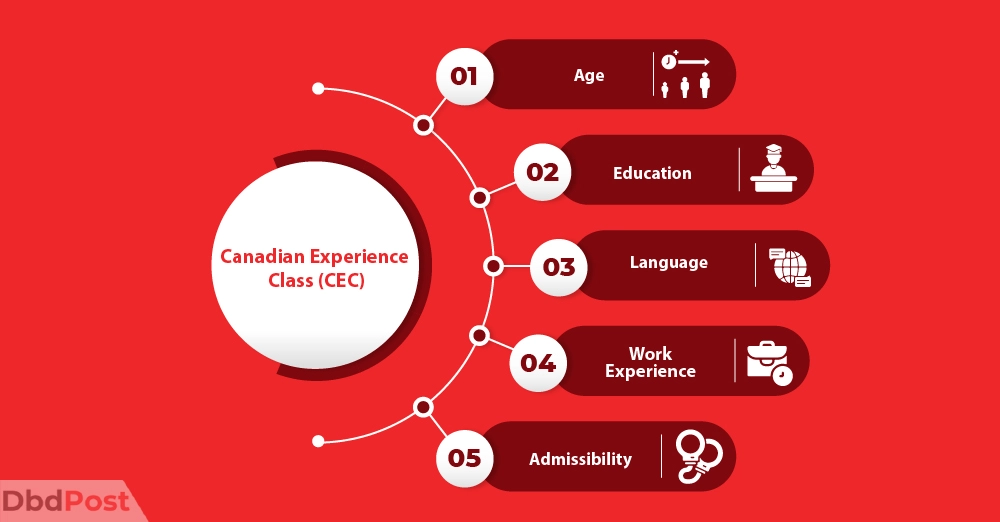
The Canadian Experience Class (CEC) is an immigration program for foreign workers with Canadian work experience. The program provides a pathway to permanent residency in Canada for these workers.
To be eligible for the CEC, applicants must meet the following criteria: [2]Canada government, “CEC requirements, … Continue reading
Age: The applicant must be 18+ years or older with a valid travel document.
Education: Though education is not mandatory, having a diploma or degree is a boost. You can improve your CRS score if you have a Canadian diploma or foreign degree with Educational Credential Assessment (ECA) report.
Language: You can apply with language proficiency in English and French. The Canadian Language Benchmark (CLB) sets the standard for all immigrants to meet CLB levels. It’s based on four language skills: writing, reading, listening and speaking.
For jobs requiring TEER 0 or TEER 1 proficiency, applicants must prove a CLB of 7. Whereas, for TEER 2 or TEER 3 jobs, you need CLB 5.
Work experience: Applicants need Canada work experience of 1 year within the last 3 years. The work experience can be full-time or part-time, equivalent to 1560 working hours.
Admissibility: You are not eligible to apply if you have been engaged in any criminal activities.
2. Federal Skilled Worker Program (FSWP)
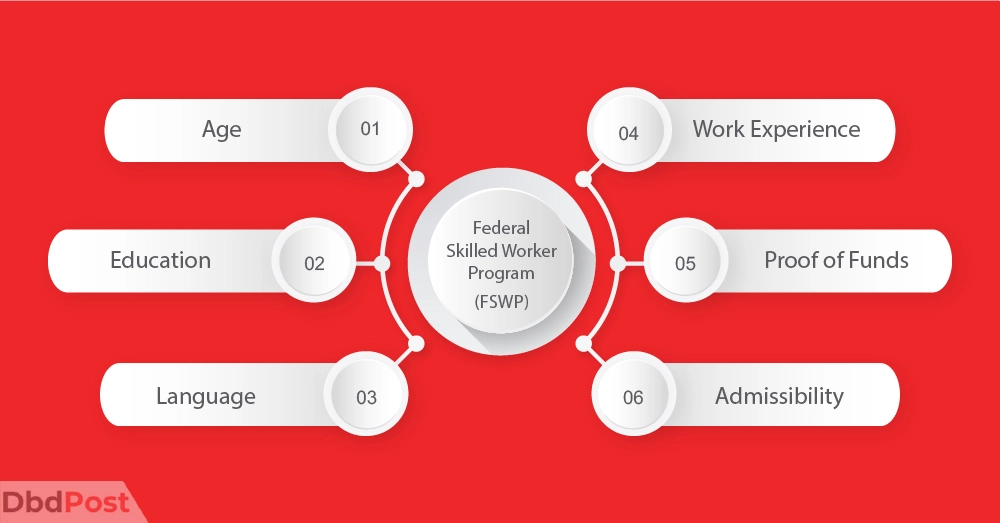
The Federal Skilled Worker Program (FSWP) allows skilled workers to apply for permanent residency in Canada.
If you’re in a profession with work experience classified as skill level 0 to 4 in the National Occupational Classification (NOC). In that case, you could be eligible to apply for your PR visa through the FSWP. [3]Canada government, “FSWP requirements, … Continue reading
To meet the requirements for this immigration program, you must fulfill the following criteria for Canada PR:
Age: The applicant must be 18+ years or older with a valid passport or travel document.
Education: You must have a Canadian secondary (high school) education. You must verify your education for the foreign degree by assessing equivalency with a similar Canadian institution.
Language: Applicants must demonstrate a strong level of language ability in English or French. You need a minimum CLB score of 7 in reading, writing, listening, and speaking.
Work experience: Applicants must have at least 1 year of continuous, full-time (or equivalent part-time) work experience in the last ten years. You need 1560 hours work experience, not exceeding 30 hours per week.
For students, the work hours must be without any gaps in employment along with NOC requirements.
Proof of funds: You need proof of funds to afford you and your family living in Canada. However, you won’t need it in case of an arranged job offer.
Admissibility: You should not have severe criminal charges. This can result in the rejection of your Canada PR application.
3. Provincial Nominee Program (PNP)
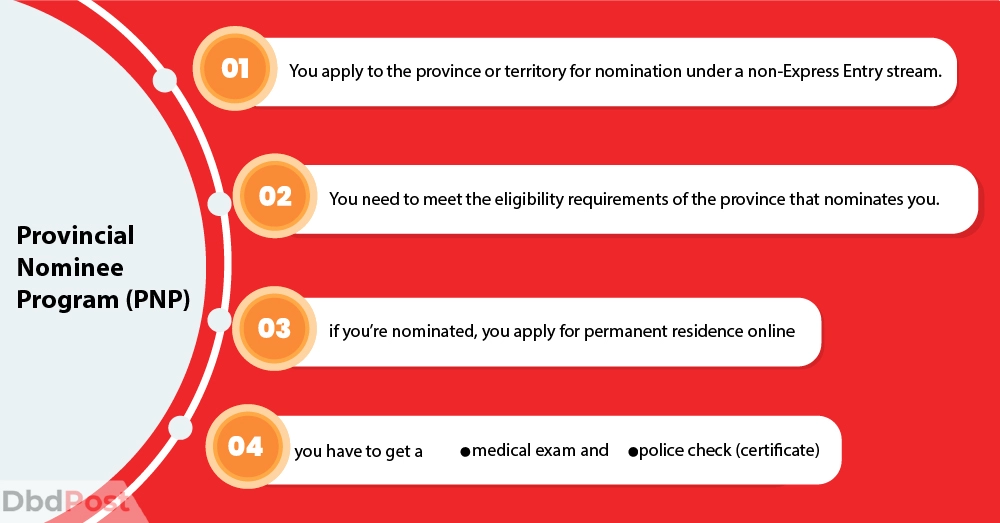
The PNP is for immigrants who can help that province’s or territory’s economic development. You can apply to the PNP using the Non-Express Entry or Express Entry system. The requirements for this visa are: [4]Canada government, “PNP requirement, https://www.canada.ca/en/immigration-refugees-citizenship/services/immigrate-canada/provincial-nominees/works.html”
Province nomination: At the minimum, you must satisfy the prerequisites of one of the province or territory’s non-Express Entry streams to be eligible. Or, you must be nominated by one of the following provinces.
- Alberta
- British Columbia
- Manitoba
- New Brunswick
- Newfoundland and Labrador
- Northwest Territories
- Nova Scotia
- Ontario
- Prince Edward Island
- Saskatchewan
- Yukon
In the case of Quebec, they have a separate Quebec-selected skilled worker visa.
Admissibility: You need to pass a medical exam and have a police clearance certificate to be eligible while applying.
4. Federal Skilled Trades Program (FSTP)
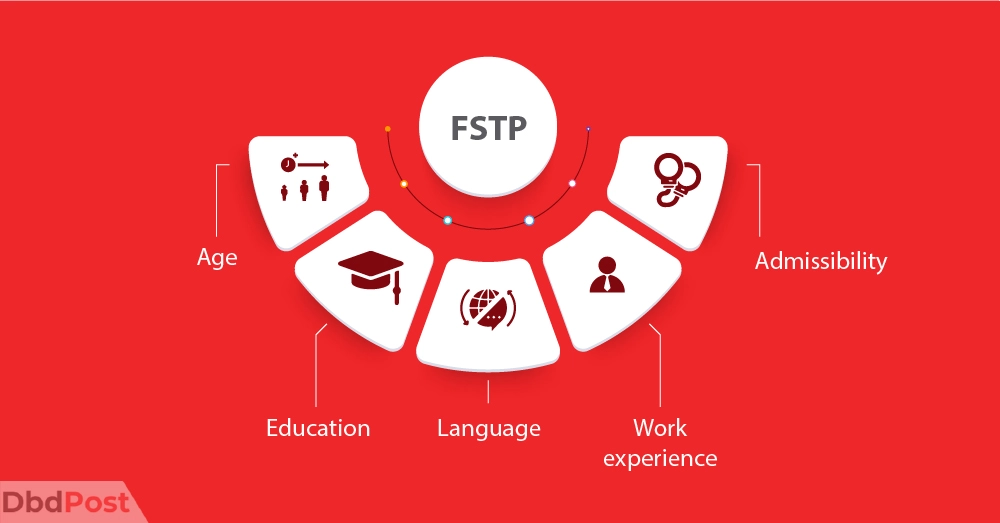
The Federal Skilled Trades Program (FSTP) allows skilled tradespeople to apply for Canadian PR. To be eligible for the FSTP, applicants must meet the following Canada PR requirements: [5]Canada government, “FSTP requirements, … Continue reading
Age: Applicants must be at least 18 years of age.
Education: Acquiring a diploma or degree can be highly beneficial, though it is not required. If you have a Canadian diploma or a foreign degree with an ECA report, your Comprehensive Ranking System score will increase drastically.
Language: You must have a CLB score of 5 in speaking and listening. Also, you need a CLB score of 4 for reading or writing. The results must be a minimum of two years old to be valid.
Work experience: You need at least two years of full-time (or part-time) work experience in a skilled trade occupation. The work experience must be within the last 5 years. And must be listed on the National Occupational Classification (NOC).
Admissibility: Applicants must not have a criminal record, pose a security threat, or have serious health problems.
Canada PR document requirements
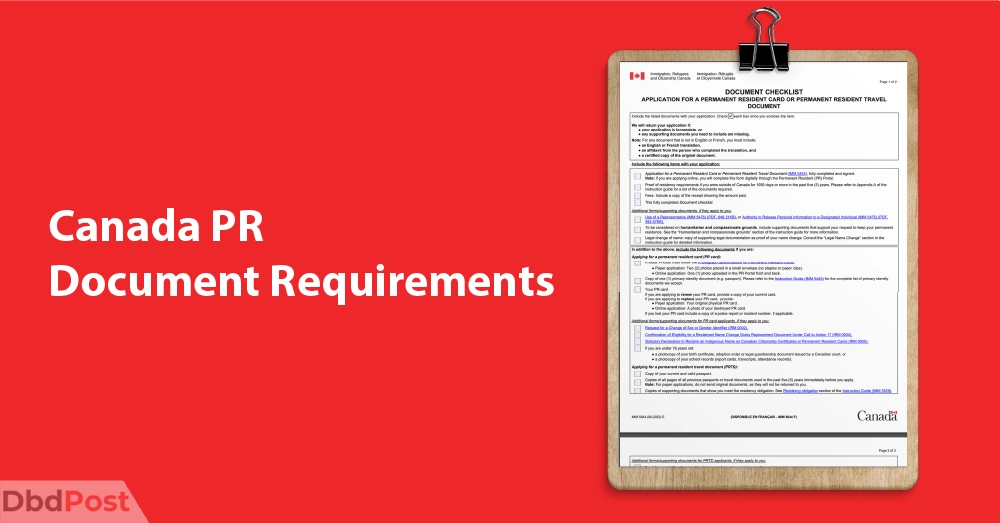
Ensure you have everything you need to become a Canadian citizen by reviewing the complete document checklist below. Don’t miss any of the crucial Canada PR requirements, so take the time to carefully review each item. [6]Canada government, “PR document checklist, https://www.canada.ca/content/dam/ircc/migration/ircc/english/pdf/kits/forms/imm5644e.pdf”
- Application for a Permanent Resident Card or Permanent Resident Travel Document (IMM 5444)
- Language test results
- Educational credential assessment report for foreign education or diploma
- Proof of residency (outside of Canada for 1095+ days) or in the last 5+ years
- Processing fee payment slip
- Legal documentation as proof of your name change(if applicable)
- 3 photos for PR card that follows Canada PR photograph specifications
- Copy of primary identity document (Passport)
- Police clearance certificates
- Medical exam certificates
- Proof of funds
- Old PR card or copy (if you are renewing or replacing existing PR card)
Additional documents (if applicable)
- Canadian job offer
- Provincial nomination
- Proof of Canadian education
- Birth certificates of dependent children (or adoption certificates)
- Marriage certificates
- Common law or spouse form (Married, divorced, or death certificates of spouse)
- IMM 5476 form for the use of representative
- Proof of relative in Canada
- Sex change or gender identifier certificate
- Confirmation of reclaimed name change
- Declaration of reclaim of indigenous name on Canada PR
For applicants 18 years below
- Photocopy of birth certificate
- Adoption order or legal guardianship issued by the Canadian court
- Copy of school report cards, transcripts, or attendance records
Dependent family sponsorships
- Sponsorship agreement and undertaking (IMM 1344)
- Financial evaluation of sponsor (IMM 1283)
- Generic application form to Canada (IMM 0008)
- Schedule A: background/declaration (IMM 5669)
- Additional Family Information (IMM 5406)
- Representative information (IMM 5476) (if used)
- Statutory declaration of common law union (IMM 5409)
- Medical condition statement
- Permanent resident status copy of sponsor of both sides
- Photocopy of marriage certificate (if applicable)
- Passport (Number, issue date, expiry date, name, date of birth)
- Proof of language proficiency
- Police clearance certificate
- Education certificates (if any)
- Fee payment slip
- Photos are taken within six months before the application
- Children’s information like birth or adoption certificate(if applicable)
Application Fees

The cost of your application will vary based on your specific circumstances. This section will provide a breakdown of the fees for both primary and dependent applicants. [7]Canada government, “PR fees, https://www.cic.gc.ca/english/information/fees/fees.asp#permanent:~:text=Economic%20immigration%20(including%20Express%20Entry)”
For the primary applicant: 1365 CAD
- Processing fee: 850 CAD
- Right of permanent residence fee: 515 CAD
Spouse application fee: 1365 CAD
- Processing fee: 850 CAD
- Right of permanent residence fee: 515 CAD
Dependent child fee: 230 CAD per child
Biometrics fee: 85 CAD per person or 170 CAD for a family of 2 or more people
Tips for budgeting and saving for the fees
Budgeting and saving for your Canada PR application fees don’t have to be a struggle. Start by figuring out exactly how much you need to save, then create a plan to put aside a little bit each day.
Check out these helpful tips to get started: [8]Better Money Habits, “Tips for saving, https://bettermoneyhabits.bankofamerica.com/en/saving-budgeting/ways-to-save-money”
- Allocate a certain amount for saving for Canada application fees.
- Set up automatic transfers from your main account to your savings account.
- Find ways to increase your income, such as a side job or freelance work.
- Avoid unnecessary expenses like subscriptions, entertainment, or dining out.
- Regularly track your progress and adjust your budget.
- Consider a low-interest loan if you do not have the capital.
How to pay the fees for the application?

Pay your Canada PR application fees online using your credit or debit card.
Timeliness is key here, so make sure you pay your fees on time to avoid rejection of your application.
And if you need to, you can request a refund before your application’s processing begins.
Tips to success
Maximize your chances of becoming a permanent resident in Canada by following a strategic plan.
Applying for PR can be complex, so it’s crucial to ensure that you do everything correctly to meet the Canada PR requirements.
How to increase your chances of being approved for Canada PR
Boost your approval odds in the Express Entry pool by taking these proactive steps. Whether you’re preparing to apply or waiting for a decision, these tips will give you a better chance of success. [9]Canada government, “Things to do while waiting, https://www.canada.ca/en/immigration-refugees-citizenship/services/immigrate-canada/express-entry/submit-profile/waiting-pool.html”
Let’s go through the measures you can take to increase your chances of being approved.
- Carry out in-depth research to understand all the eligibility criteria.
- Hire an RCIC-certified consultant if you need more confidence.
- Research Canada permanent resident visa programs offered by IRCC and other immigration authorities git for your portfolio.
- Carefully follow instructions during the application process.
- Apply for programs that align with your qualifications and experiences.
- Maintain a clean background and avoid illegal activities.
- Gather all the necessary documents in advance.
- Address any gaps in work history.
- Sign up on the Job Bank and actively apply for positions in the Canadian work industry.
- Be aware of all the applications and additional fees.
- Improve language and communication skill levels.
- Enhance skill set through training or courses during application.
- Prepare well for the interview by practicing common questions.
Common mistakes to avoid in the application process
Maximize your chances of success by avoiding common mistakes in your Canada PR application. Critical errors can result in a ban of up to five years, so it’s crucial to be mindful of what to avoid. [10]Canada government, “Reasons you may be inadmissible to Canada, https://www.canada.ca/en/immigration-refugees-citizenship/services/immigrate-canada/inadmissibility/reasons.html”
Here are some common mistakes to keep in mind:
- Provide accurate and truthful information in your application.
- Only apply to programs you qualify for and avoid rejection.
- Try not to avoid any deadlines while applying.
- Avoid lying or providing false or misleading information in your application.
- Submit original and authentic financial documents.
- Do not forge proof of funds, police certificates, or medical certificates.
- Ensure that all required documents, such as a passport and language results, are still valid at the time of your application.
- Avoid paying upfront or fully trusting unqualified agents. Fact-check before hiring an immigration consultant.
- Keep IRCC informed of changes to your address, employment status, or other relevant information.
Related Stories
- Find the various best consultancy for Canada PR in our guide if you need expert guidance for your Canada PR application.
- Learn more to be eligible for Canada PR, as it is important to understand the work experience requirements.
- If you’re looking for an efficient way to immigrate to Canada, our guide on Express Entry Canada is worth considering.
- Want to know how to get PR in Canada? Our guide has covered what you need to know in detail.
- Before applying for Canada PR, it’s important to understand the requirements and eligibility criteria. Check out our guide on eligibility – here.
FAQs
How do I prove that I am financially self-sufficient?
Permanent resident Canada requirements require financial self-sufficiency. You need to provide proof of funds certificates and financial details.
This verifies you can support yourself without relying on government assistance.
What is included in the medical examination for Canada PR?
The medical examination in Canada PR rules includes a physical exam with a doctor.
They will check if you have any diseases or medical conditions that could be harmful to people in Canada. The tests include X-rays, bold tests, urine tests, etc.
Do I need a job offer to be eligible for Canada PR?
No, having a job offer is not a requirement for a Canada PR visa, it varies based on the immigration program.
Programs like the FSWP, do not require a job offer, while the PNP, requires a nomination from the province.[11]Canada government, “PNP, … Continue reading
Final thoughts
The journey to becoming eligible for Canada PR is a challenging one that requires research, planning, dedication, and financial resources.
Ensure that you thoroughly understand the criteria for PR in Canada for each program before starting your application and follow instructions carefully throughout the process.
We hope this comprehensive Dbd guide on Canada PR requirements has provided you with valuable insights and understanding of the application process.
If you have any doubts or need assistance, don’t hesitate to seek the help of professional immigration services.
- 107shares
- Facebook Messenger
About the author
DbdPost Staff is a team of writers and editors working hard to ensure that all information on our site is as accurate, comprehensive, and trustworthy as possible.
Our goal is always to create the most comprehensive resource directly from experts for our readers on any topic.
